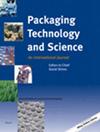Mapping class learning outcomes of the core curriculum to university learning goals at Michigan State University's School of Packaging
IF 2.8
4区 工程技术
Q2 ENGINEERING, MANUFACTURING
引用次数: 0
Abstract
Class learning outcomes (CLOs) supporting the interdisciplinary curriculum of the School of Packaging (SoP) at Michigan State University (MSU) were mapped to competency‐based, programmatic learning outcomes (CPLOs) undergirded by broad learning goals of the University (MSU‐LGs). Six CPLOs related to the core curriculum, including the ability to design and evaluate packaging systems, as well as students' professionalism and teamwork skills, were developed using consensus building with all teaching faculty. Relationships, from specific to broad (i.e., CLOs to CPLOs to MSU‐LGs), were mapped with the SoP faculty. This mapping scheme (class‐specific CLOs supporting broader program CPLOs and, ultimately, MSU‐LGs) was developed to guarantee alignment of expectations for learning from the course to the packaging program to the MSU‐LGs. From Fall 2018 until Fall 2019, assessment tools, including rubrics and assignments intended to evaluate learning, were developed to assess core and elective courses offered by the SoP. Data collection of each student's performance was conducted utilizing Watermark's VIA software from Fall 2018 until Fall 2021 and continuous. Assessment of student performance provided evidence of learning across the SoP curriculum as well as how CLOs, delivered and assessed at the individual student level, translate into competence achieved at the programmatic and university levels.密歇根州立大学包装学院将核心课程的课堂学习成果映射到大学学习目标
支持密歇根州立大学(MSU)包装学院(SoP)跨学科课程的课堂学习成果(CLOs)被映射为基于能力的计划性学习成果(CPLOs),该成果以大学(MSU - LGs)的广泛学习目标为基础。六个与核心课程相关的CPLOs,包括设计和评估包装系统的能力,以及学生的专业精神和团队合作技能,是通过与所有教师建立共识而开发的。关系,从特定到广泛(即,clo到CPLOs到MSU - LGs),与SoP教员进行了映射。这种映射方案(类特定clo支持更广泛的程序CPLOs,最终,MSU - LGs)的开发是为了保证从课程到包装程序到MSU - LGs的学习期望的一致性。从2018年秋季到2019年秋季,开发了评估工具,包括用于评估学习的标准和作业,以评估SoP提供的核心课程和选修课程。从2018年秋季到2021年秋季,使用Watermark的VIA软件对每个学生的表现进行数据收集,并持续进行。对学生表现的评估提供了学习SoP课程的证据,以及CLOs如何在学生个人水平上交付和评估,转化为项目和大学水平上取得的能力。
本文章由计算机程序翻译,如有差异,请以英文原文为准。
求助全文
约1分钟内获得全文
求助全文
来源期刊

Packaging Technology and Science
工程技术-工程:制造
CiteScore
4.90
自引率
7.70%
发文量
78
审稿时长
>12 weeks
期刊介绍:
Packaging Technology & Science publishes original research, applications and review papers describing significant, novel developments in its field.
The Journal welcomes contributions in a wide range of areas in packaging technology and science, including:
-Active packaging
-Aseptic and sterile packaging
-Barrier packaging
-Design methodology
-Environmental factors and sustainability
-Ergonomics
-Food packaging
-Machinery and engineering for packaging
-Marketing aspects of packaging
-Materials
-Migration
-New manufacturing processes and techniques
-Testing, analysis and quality control
-Transport packaging
 求助内容:
求助内容: 应助结果提醒方式:
应助结果提醒方式:


